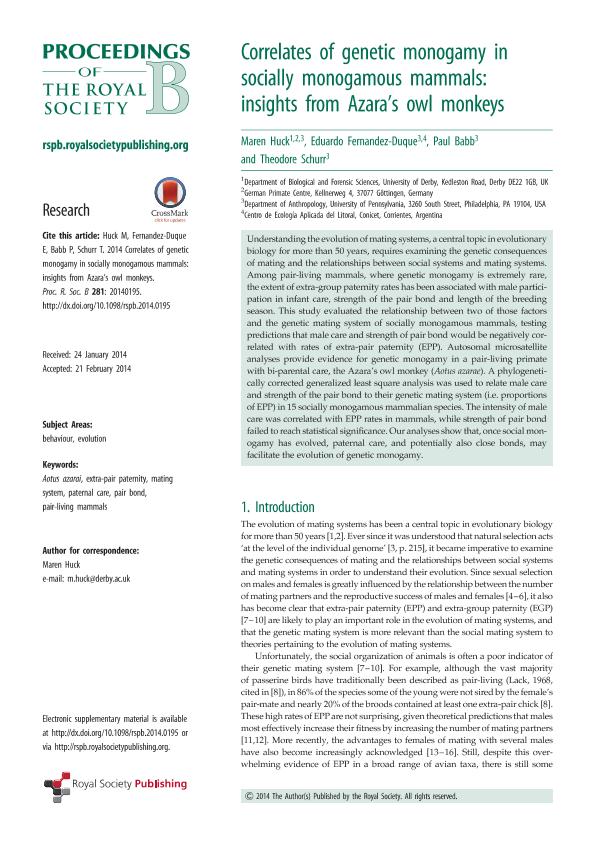Mostrar el registro sencillo del ítem
dc.contributor.author
Huck, Maren
dc.contributor.author
Fernandez Duque, Eduardo

dc.contributor.author
Babb, Paul
dc.contributor.author
Schurr, Theodore G.
dc.date.available
2016-12-27T18:27:51Z
dc.date.issued
2014-02
dc.identifier.citation
Huck, Maren; Fernandez Duque, Eduardo; Babb, Paul; Schurr, Theodore G.; Correlates of genetic monogamy in socially monogamous mammals: insights from Azara’s owl monkeys; The Royal Society; Proceeding of Royal Society; 281; 1782; 2-2014; 20140195
dc.identifier.issn
1471-2954
dc.identifier.uri
http://hdl.handle.net/11336/10323
dc.description.abstract
Understanding the evolution of mating systems, a central topic in evolutionary biology for more than 50 years, requires examining the genetic consequences of mating and the relationships between social systems and mating systems. Among pair-living mammals, where genetic monogamy is extremely rare, the extent of extra-group paternity rates has been associated with male participation in infant care, strength of the pair bond and length of the breeding season. This study evaluated the relationship between two of those factors and the genetic mating system of socially monogamous mammals, testing predictions that male care and strength of pair bond would be negatively correlated with rates of extra-pair paternity (EPP). Autosomal microsatellite analyses provide evidence for genetic monogamy in a pair-living primate with bi-parental care, the Azara’s owl monkey (Aotus azarae). A phylogenetically corrected generalized least square analysis was used to relate male care and strength of the pair bond to their genetic mating system (i.e. proportions of EPP) in 15 socially monogamous mammalian species. The intensity of male care was correlated with EPP rates in mammals, while strength of pair bond failed to reach statistical significance. Our analyses show that, once social monogamy has evolved, paternal care, and potentially also close bonds, may facilitate the evolution of genetic monogamy.
dc.format
application/pdf
dc.language.iso
eng
dc.publisher
The Royal Society
dc.rights
info:eu-repo/semantics/openAccess
dc.rights.uri
https://creativecommons.org/licenses/by-nc-sa/2.5/ar/
dc.subject
Aotus Azarai
dc.subject
Extra-Pair Paternity
dc.subject
Mating System
dc.subject
Paternal Care
dc.subject.classification
Genética y Herencia

dc.subject.classification
Ciencias Biológicas

dc.subject.classification
CIENCIAS NATURALES Y EXACTAS

dc.title
Correlates of genetic monogamy in socially monogamous mammals: insights from Azara’s owl monkeys
dc.type
info:eu-repo/semantics/article
dc.type
info:ar-repo/semantics/artículo
dc.type
info:eu-repo/semantics/publishedVersion
dc.date.updated
2016-12-26T18:45:53Z
dc.journal.volume
281
dc.journal.number
1782
dc.journal.pagination
20140195
dc.journal.pais
Reino Unido

dc.journal.ciudad
London
dc.description.fil
Fil: Huck, Maren. University of Derby; Reino Unido. German Primate Centre; Alemania. State University Of Pennsylvania; Estados Unidos
dc.description.fil
Fil: Fernandez Duque, Eduardo. Consejo Nacional de Investigaciones Científicas y Técnicas. Centro Científico Tecnológico Nordeste. Centro de Ecologia Aplicada del Litoral (i); Argentina. State University Of Pennsylvania; Estados Unidos
dc.description.fil
Fil: Babb, Paul. State University Of Pennsylvania; Estados Unidos
dc.description.fil
Fil: Schurr, Theodore G.. State University Of Pennsylvania; Estados Unidos
dc.journal.title
Proceeding of Royal Society
dc.relation.alternativeid
info:eu-repo/semantics/altIdentifier/doi/http://dx.doi.org/10.1098/rspb.2014.0195
dc.relation.alternativeid
info:eu-repo/semantics/altIdentifier/url/http://rspb.royalsocietypublishing.org/content/281/1782/20140195
Archivos asociados
